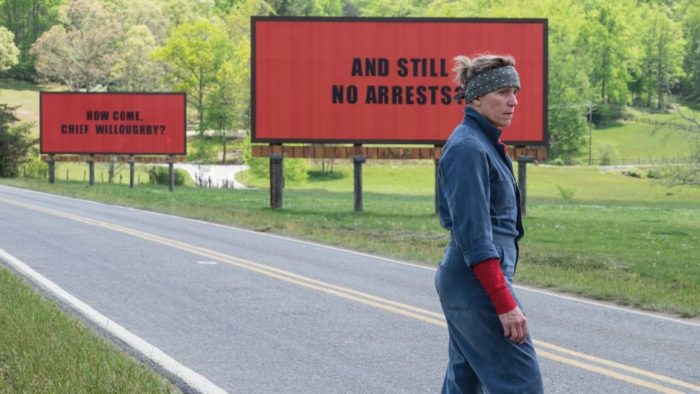VOD film review: Three Billboards Outside Ebbing, Missouri
Review Overview
Cast
8Humour
8Hopeless hate
8David Farnor | On 02, Nov 2018
Director: Martin McDonagh
Cast: Frances McDormand, Woody Harrelson, Sam Rockwell, Abbie Cornish, Peter Dinklage, John Hawkes
Certificate: 15
“You definitely don’t need hate. Hate never solved nothing.” That’s Police Chief William Willoughby in Three Billboards Outside Ebbing, Missouri, a dark drama inspired by a true story that won two Oscars. But if that sounds like a clear-cut message from a heartwarming story of redemption, you’re forgetting one thing: this is a Martin McDonagh film. And heartwarming stories of redemption are as far away from the In Bruges director as romantic comedies are from Michael Haneke.
The film follows Mildred Hayes (Frances McDormand), a mother whose daughter is brutally killed. With no one brought to justice over half a year later, she takes matters in her own hands, hiring three billboards outside her titular hometown to send a message to the cops. “RAPED WHILE DYING” reads the first. “STILL NO ARRESTS?” questions the second. “HOW COME, CHIEF WILLOUGHBY?” demands the third.
It’s a very public cry about a very private matter, one of anger as much as pain, and Martin McDonagh’s film succeeds precisely because it leans into all of those extremes – it’s a mess of rage, tragedy, revenge and justice, one that doesn’t shy away from the complexities of each, but does shy away from easy resolutions or comfortable footing.
McDormand is magnificent, anchoring the whole thing in the second career-defining turn of her career (after Fargo), and the striking contrast between those two equally strong characters only reinforces the film’s power: where Fargo’s detective was an optimistic, resilient figure, Mildred is racked with grief and fury, fighting through it to bring about punishment for an unspeakable crime. She does so, despite the whole town being against her – not only because of the blunt, graphic nature of the adverts, or her brash disposition, but the fact that she continues her quest in the face of Chief Willoughby’s own tragic situation. “Everybody is with you about Angela,” the local padre informs her. “Nobody is with you about this.”
And that’s precisely the awkward brilliance of McDonagh’s film, which finds spiky unpleasantness in every corner of this community – and dares to consider the humanity behind it. Just as in In Bruges, there are shades of grey to every character and person we meet, as McDonagh studiously avoids stereotypes or broad brush strokes. And so we meet Officer Dixon (Sam Rockwell), a dumb, racist policeman, who commits horrible atrocities, yet still has his own sad backstory relating to his mother. That, however, is no indication that the prejudiced Dixon is going to be redeemed.
Rockwell matches Harrelson and McDormand in populating this portrait of smalltown America with depth and darkness. He also brings a jet-black vein of humour to proceedings; also like In Bruges, Three Billboards is shockingly funny, thanks to McDonagh’s signature brand of disturbing one-liners, blunt banter and scathing insults.
But where the director’s mean streak can sometimes lead to unchecked macho violence without much depth (see: Seven Psychopaths), Three Billboards benefits from McDonagh’s masterful decision to centre everything around McDormand’s female lead. Even then, though, easy answers aren’t on offer: things barrel along unpredictably, right up to an ending that teases the cliché of Hollywood hope but in reality, only sees the wasteful eye-for-an-eye chain continue. Hate never solved nothing, Three Billboards tells us, and it doesn’t let us see a way out of its damaging cycle.


















